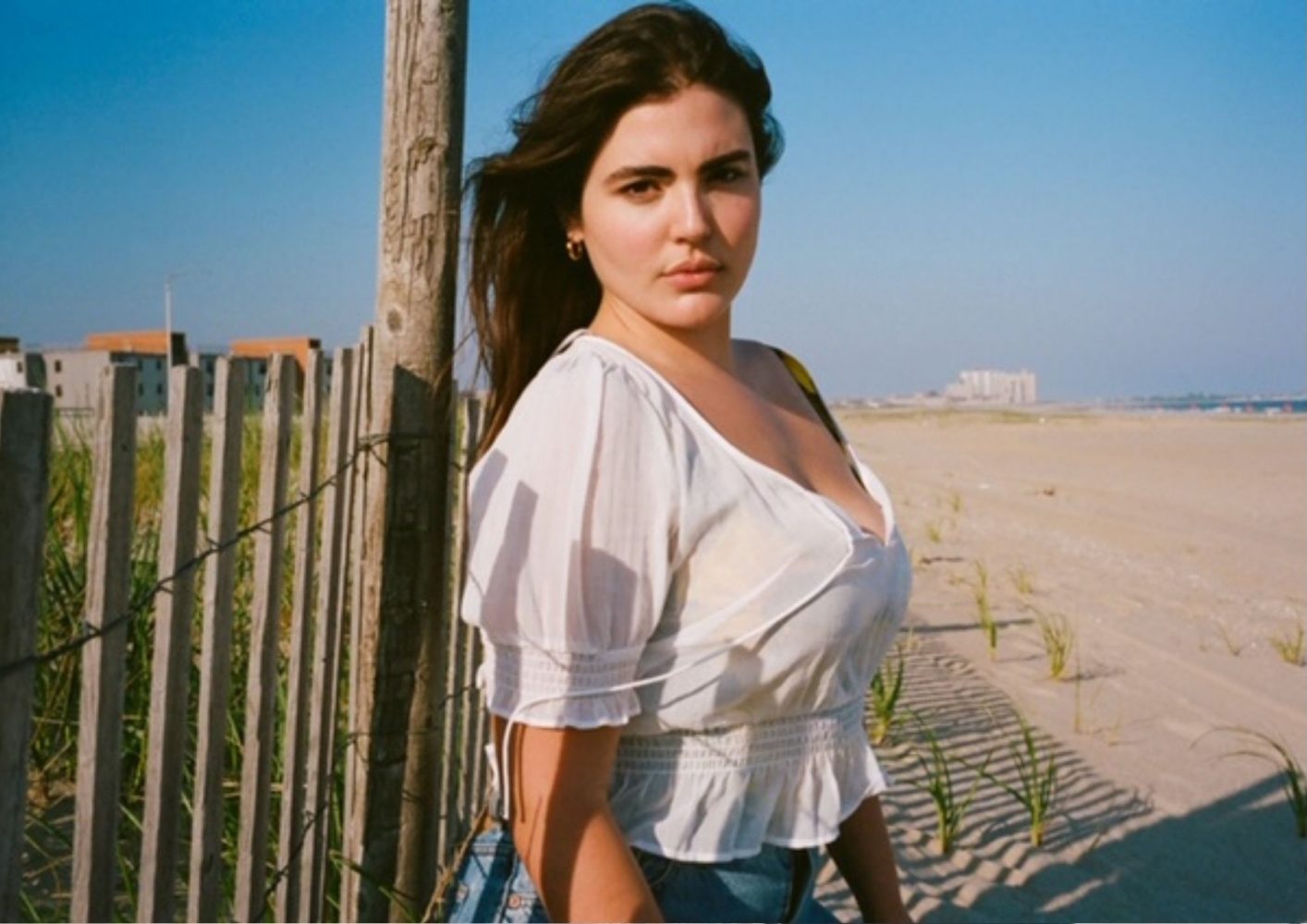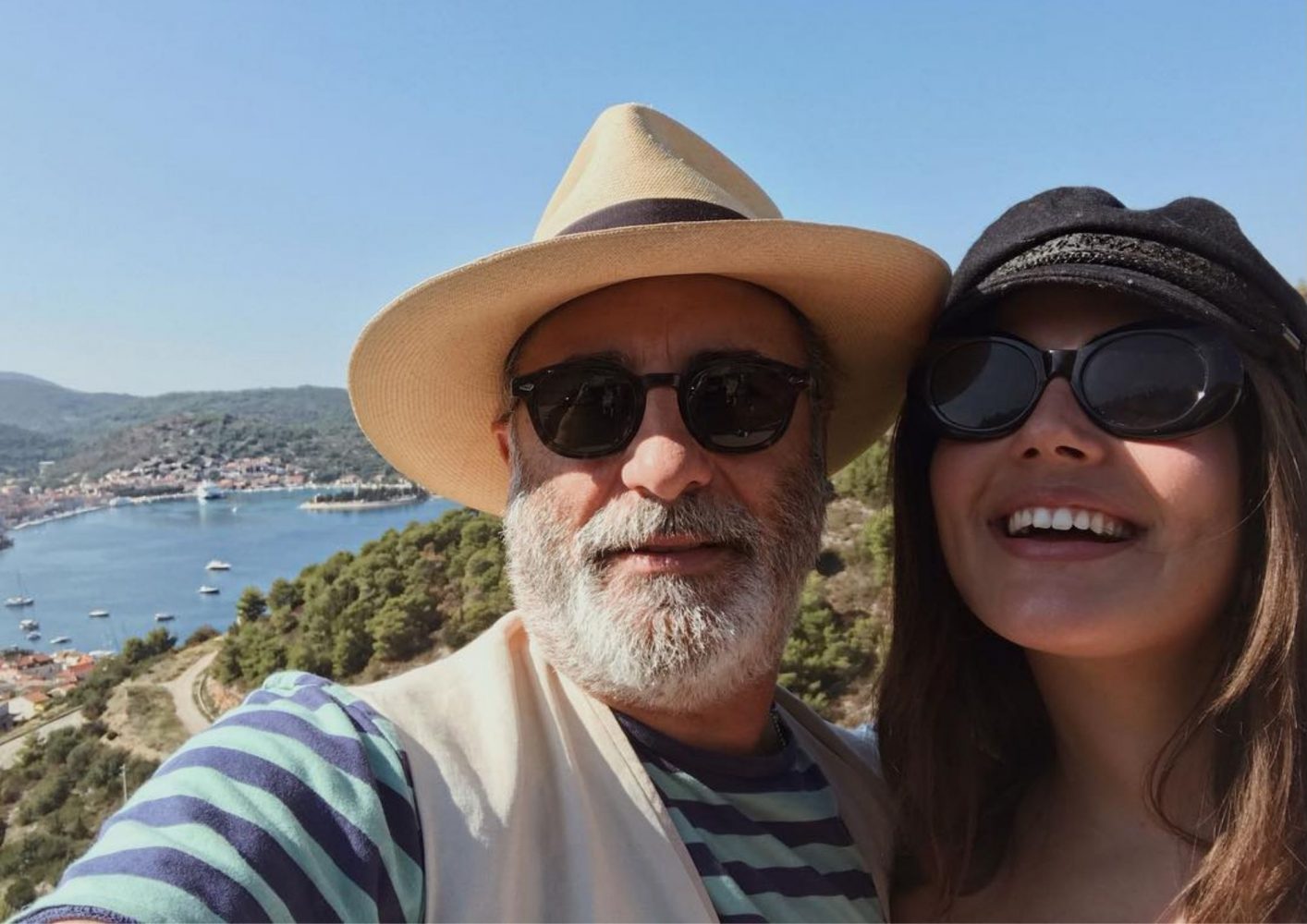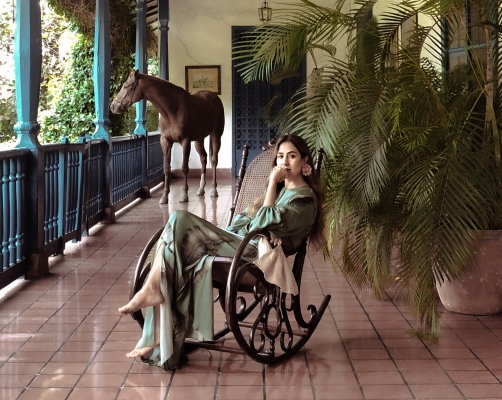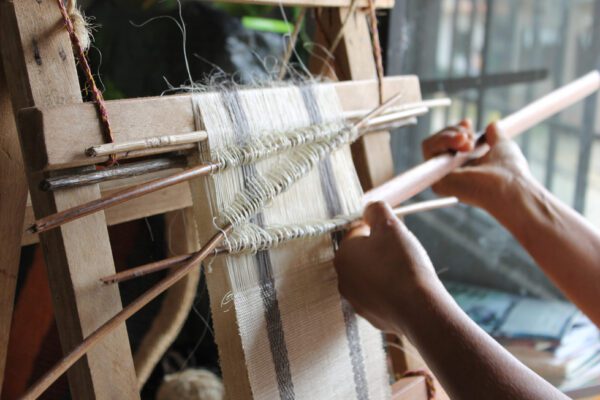
COFFEE WITH
ALESSANDRA GARCIA: “EVERY GIRL CAST IS ANOTHER STEP FORWARD INTO MORE DIVERSITY”
Name: Alessandra Garcia
Profession: Model
Place of birth: Los Angeles, United States
Heritage: Cuban-American
Zodiac sign: Gemini
Instagram: @alessandragl
LATINNESS: You’re Cuban-American raised in the United States. Tell us more about where you grew up?
ALESSANDRA: So my parents grew up in Miami. They both were born in Cuba, left right after the revolution in 61′ or 62’, I believe, and they grew up in Miami. Then my dad moved to Los Angeles when he was 20, and my mom (they were still dating while she was in college at University of Miami) moved to Los Angeles with my dad. My sister Dominique was born in Miami just because there was an actor strike going on, and they were home in Miami. The rest of us were born and grew up in Los Angeles. I grew up going back and forth between Los Angeles and Miami because my entire family is in Miami, all my aunts, uncles, my grandmothers and my cousins. With my dad’s schedule, most summers we were in Miami. We probably spent four or five months out of the year there.
LATINNESS: What was your experience like growing up in Los Angeles where the Latin culture is perhaps not as prevalent as it is in Miami?
ALESSANDRA: It definitely was an interesting balance because most of my friends in Los Angeles are not Latin. My Latin culture was unique to my surroundings for sure, and I loved it. I loved growing up and having that because I was very proud of my parents. The way that we were raised, we’re always proud of our Cuban heritage, and it was never something I was ashamed of. I was very proud of the balance between the two cities that I grew up in. In Miami, from the second you land, you don’t feel like you’re in the US because it is so diverse in terms of the Latin community.
I did struggle in a sense, because of my identity with being more American from Los Angeles, and then everybody in Miami being Latin. In Miami, everybody grows up and they know how to speak Spanish. I grew up in Los Angeles where I didn’t speak Spanish every day, so I don’t speak it very well compared to my cousins and my friends. That’s something I’ve always struggled with. I am a true Cuban-American in that sense because of that American culture that I had to grow up in, English being the language I spoke the most. While in Miami I think there is more of a 50/50 balance between the languages. People speak to their grandmothers or their friends or the people on the street. You know, you go to a store in Miami, and most people speak Spanish. The advertisements you see in the city, it’s definitely different, the percentage is higher. I am super proud though, and I feel very connected to the Cuban culture.
LATINNESS: Your father Andy Garcia is a huge advocate for Cuban history and culture. When I think of your dad, I think of Cuba. How do you feel that has influenced you?
ALESSANDRA: I mean, it’s great. There’s not that many Cuban people in the spotlight or celebrities, so that’s always been something he’s very proud of and tied to, and an advocate for in terms of spreading awareness and the history. I’ve always felt it important to use the small platform I have to speak up for that, because I don’t think a lot of people talk about it as much. It is like this mysterious island, and the relationship that people have with it is very different. We grew up not really learning about it in that sense of its history. We learned about it in America, in terms of our history— the Cuban missile crisis and that kind of stuff. At the end of the day, there are a lot of things people don’t know, and I find a great responsibility to try and use my platform to tell the truth and spread awareness of what’s going on, and hopefully people can learn, just as I want to learn about other people’s cultures.
LATINNESS: So what was it like growing up with famous parents?
ALESSANDRA: In Los Angeles it’s not that cool. You know, the entertainment industry is such a huge part of people’s lives everyday just because, like, ‘Oh, my uncle, my sister, my dad, my mom, my cousin’, they’re all either a producer, a writer, a director, actor or costume designer in the industry, most likely. There’s always a side to it, so it was never really that cool, growing up it was just dime a dozen. My parents are very private and very normal. It was cool, sure, we went to some premieres and we got to travel, but at the end of the day, we had dinner on the table at 7:00 PM, and we were chill. My dad took me to school, my mom picked me up, we’re a normal family.

LATINNESS: Going back to your American upbringing, was there a point when you really felt your latinness?
ALESSANDRA: People have in their mind what a Latin person looks like, what they sound like and who they are. I always want to bring who I am to the table, but don’t necessarily look like what people want Latin people to be. I do think I look a little Latin, but at the end of the day, there is a stereotype, unfortunately, about how a Latino looks because that’s just how the media has portrayed Latin people of all cultures, you know, Mexican, Puerto Rican, etc. Everybody has their look, and I get pigeonholed into like, ‘Alright, well, yeah, you might be Latin, but it’s not like it’s a diversity thing because no one is going to know that you are Latin.’ A couple of times in my job I’ve been sort of whitewashed because I don’t look Latin enough to the consumer or to the magazine, but at the end of the day, if you were to just speak to me, you’ll know that I’m Latin. That’s what I identify with— the food, the music, the traditions— which are tied to Latin history, Cuban history, specifically.
I think that my latinness is all tied to my family and my friends and the community around me. What I grew up hearing on Christmas, Easter and New Year’s, all of these traditions that we take forward and keep alive from what previous generations have taught us. That’s what keeps me Latin, you know? I went to Colombia recently for the first time, to Cartagena specifically, for my cousin’s bachelorette, and it was just so much fun to see what Colombia was even from that. It’s just so amazing to see the ties and the connections and the beauty and the warmth. I think it’s such an amazing rainbow of Latin cultures to celebrate, which is why I love what you are doing. I think it’s a great way of showing that.


LATINNESS: You recently moved to New York to study film production. Why did you choose New York as opposed to staying in California?
ALESSANDRA: Well, I didn’t want to go to college in Los Angeles. I really wanted to leave and do something outside of where I grew up. I first went to Boston my freshman year, and I hated Boston. I was in New York every weekend, so I fell in love with New York again. I had a bunch of friends there, and I thought it was just a cool city to grow my independence.
LATINNESS: And when did modeling come into the picture?
ALESSANDRA: I started modeling at the end of my second year of college. Someone had come up to me in a mall during my summer going into freshman year of college, and I was like maybe, I’ll think about it. I kind of dabbled and met with some people, but then I decided I just wanted to be a student and enjoy my college years. Then my second year, I thought, you know, I could be down to make a little side money and see what happens. It was sort of the start of fashion embracing diversity, and I thought it was a really exciting time to get involved with that and be a part of it. I sort of dabbled in that, but was still part time in school because I wanted to get my degree. It actually took me five years to graduate because I was part time, so it was the last two and a half years that I was really part time working. Then, once I graduated, I signed with IMG and that was when I really began full time.


LATINNESS: You walked the Dolce & Gabbana runway and you’ve worked with H&M, amongst many other big names. When would you say was your first big break?
ALESSANDRA: I don’t know. I feel like I have goals and dreams in the fashion industry that haven’t even been achieved yet because, you know how it is in fashion, there’s commercial success and there are commercial things that you want to do, but then there’s also high fashion where I feel like I still have so many goals that I want to reach. In terms of my campaigns and the brands I’ve worked with, I’ve done some really incredible stuff that I’m so grateful for, but there is still so much stuff in editorial, magazines and high fashion that I’ve only dabbled in.
It’s really kind of hard for curvy girls to get their foot in the door because there are only so many people that they cast, and there are so many beautiful girls. So imagine, it is harder to get those jobs because they are so few and far between. I think that the industry is getting more diverse, which I think is really exciting. Every girl that is cast is another step forward into more diversity, which is really incredible, but I still feel like there’s so much that I haven’t broken into. Of course, there are many things I’ve done that I’m really proud of, it’s just I’ve never felt ‘Oh, yeah, I’m here. I’ve made it. I’m done.’

LATINNESS: Where do you think the fashion industry is right now in terms of inclusivity?
ALESSANDRA: I think it’s definitely been on a steady rise for the past five years, but I think it always can do better. There’s still sort of like this elite system that’s in place of who gets to decide what is cool and who is pretty and what is interesting.
The first thing that we see in fashion is we see the clothes on a runway, and I think that runway still has so much work to do in terms of inclusivity. That’s where the samples are made, that’s where we first see this image of beauty that the designer is presenting to us. I think the trickle down effect from there will really help shift the fashion industry into a more positive direction because that’s our first interaction— how we get to see the clothes on people, how we perceive them and how we can imagine them.
When editors— you guys know this better than me— but I can imagine an editor, when they’re imagining the photo shoots and what their styling is going to look like, it’s only going to help to see them on girls that aren’t one size or one skin color. I always say, there are so many colors to choose from in the crayon box, why are you limiting yourself to just this little pack? A beautiful photo that’s captivating, but is not a girl that’s a size zero. Or maybe it’s a couple of girls that are different sizes, and not a white girl. It can still be a captivating, beautiful image. That, to me, is the point of fashion in terms of editorials, campaigns and whatever image you’re producing in fashion, it’s about creating a captivating image that doesn’t mean, let’s limit ourselves. That limit of beauty, to me, is really dangerous.

LATINNESS: Do you think there has been actual real change?
ALESSANDRA: I think that people are rising to the occasion, but then sometimes I look on Instagram and see brands, and I think we’re not doing enough. I just feel like it’s way easier than you think it is, and don’t understand why they don’t want to do it. I get that in their mind, we’ve been so conditioned to think a certain way of what beauty is that some people are still really stuck in this system of, you know, what is beautiful.
I get really frustrated when I see brands on Instagram, especially because that’s where we really consume images the most, so it’s as important what they put there as what is put in magazines. I just feel really frustrated that it’s a simple task and it’s the right task morally, and I just feel like sometimes they’ve been dropping the ball.
I have hope and I do think that from the talk there are still things happening, and hopefully that trickles down to everything. I’m constantly having these conversations with brands when they reach out to me, or I’ll just shoot them a DM to say ‘Hey, I see you go up to this size, why don’t you use girls this size? To the extent of influencers, why aren’t you sending the product to those girls to give you those photos so that you can post them on yours so it’s a cycle of images that we are consuming?’
I can ask you guys, in the past five years, have you seen a change in your way of thinking with diversity? I know I have. I just think that it works for me. If I see more diverse girls, I’m going to feel better about myself. Just as beautiful and inspirational as the girls that were populating the majority of the images that we used to see five years ago. I can guarantee you the ones that sell the most are probably the bigger sizes.
LATINNESS: Did you always imagine yourself working in the public eye?
ALESSANDRA: No, both my sisters are actresses, and I was always the girl that was backstage. I did plays in school, but I did production, I did make-up and hair, I did costumes. I was never the one on stage, I never wanted to be an actress. So no, I never thought that I was going to be the one in front of the camera, but here we are.

LATINNESS: We’ve seen that cooking is a huge passion of yours. Tell us more about how you started.
ALESSANDRA: Yeah, I started cooking when I was around twelve. I always love cooking, it’s sort of like therapy for me, to take my mind off of stuff. I think it’s therapy for most people because you’re able to keep your mind on something and the task-oriented situation. I was somebody that kind of moves through life sort of fast, and I’m kind of clumsy in that way, so I feel like cooking forces me to really slow down and have patience for stuff. It’s taught me to be patient, to just live in the moment and be present. I think it’s good practice for that. I love hosting, I love having friends over for dinner, I love drinking wine with them, having dinner and that sort of entertainment.
LATINNESS: Is this an inherited family passion from your parents or grandparents?
ALESSANDRA: Both my parents love to cook and that’s where I definitely found it. My grandparents, I love them so much, but mine weren’t as much of the entertainers as my parents were. I definitely got it mostly from my parents.

LATINNESS: Do you see a future for yourself in the culinary industry?
ALESSANDRA: I’ve thought about it, and maybe it’ll turn into something, but it’s also something a bit sacred to me, so I’m a little hesitant to monetize it just because it is so personal. I thought about maybe doing a cookbook, something to honor my family’s heritage. Cuban food is delicious, so why not?


LATINNESS: Do you have a favorite dish or a specialty?
ALESSANDRA: Well, for Cuban food, I love vaca frita. I make it all the time. I think it’s so good, and the chicken one is so good, too. I love both.
LATINNESS: And what do you make it with?
ALESSANDRA: My mom makes a really good congrí, which is the black beans and rice together, but I like black beans separately. I like fried plantains and an avocado salad, and I like the white rice and the black beans on its own.
LATINNESS: What is one piece of advice you’ve received that has stuck with you?
ALESSANDRA: As I grow older this one has become more and more of a thing, especially for women because we undermine ourselves a lot, so the best advice I’ve received is to never be afraid to ask because they can always say no. So it’s like making sure that you value yourself enough to ask for the raise or, in terms of any job, that you have the opportunity for more. To push, because I think, as a woman— and I’ve always felt this way— it’s really hard for me to say no. So like when something happens, you’re kind of a people pleaser, and you’re like, ‘Yeah, sure,’ but as I grow older, I’m learning and becoming a stronger person to be able to say, ‘Alright, how about this? Can we ask for more of this? I can’t do this.’ You have value in what you’re bringing to the table, so don’t undermine yourself just because it’s easy. My mom always says ‘They can always say no, just ask.’
LATINNESS: One last question, what do you love most about your Latin heritage?
ALESSANDRA: How we live life to the fullest and how we love to celebrate. I feel like Latins love to celebrate everything. We just really know how to live. I look at the people around me, the men and women in my life who are Latin, and I’m just like, they know how to live. They definitely know. They don’t take it for granted.
Images courtesy of @alessandragl



